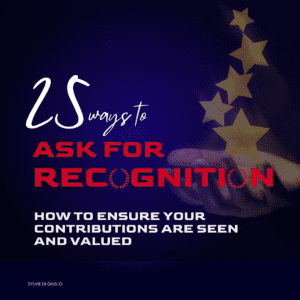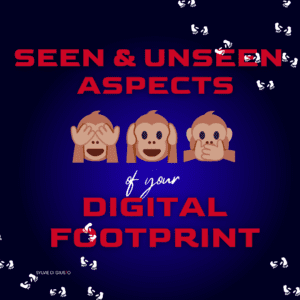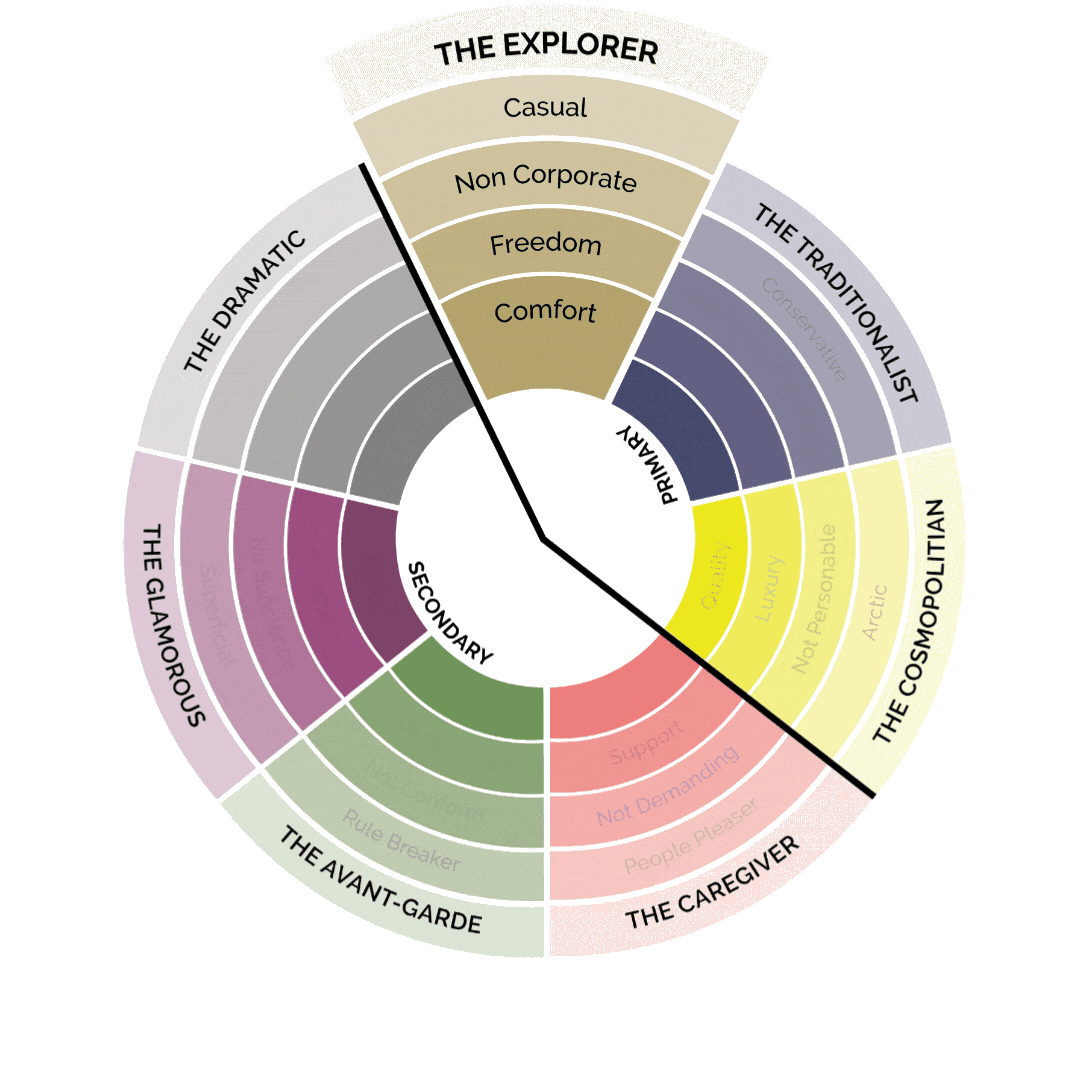Emotions In the workplace
30 Positive emotions in the workplace that impact your reputation
At work, it is essential to connect with your colleagues, managers, or customers on an emotional level. Certain positive emotions can help strengthen your relationships and build stronger connections in the workplace. These positive emotional states have several benefits for both individuals and organizations. For example, positive emotions can improve decision-making by increasing one’s perception and focus. They can also help to motivate employees and encourage creativity and innovation.
Positive emotions in sales can lead to:
- Increased collaboration and team spirit, which can help to drive business success by promoting cooperation and building trust among coworkers.
- Heightened motivation and productivity, which can help individuals to achieve their goals and contribute to organizational success.
- Better decision-making, which enables individuals to make more informed choices and respond quickly to changing circumstances.
Positive emotions in leadership can lead to:
- Enhanced creativity, which can enable leaders to come up with innovative solutions to the challenges they face in their roles.
- Greater innovation, which can help organizations stay ahead of the competition by introducing new products and services or improving existing offerings.
- Improved communication, which can help leaders to build strong relationships with their teams and keep everyone on the same page.
Positive emotions in customer service can lead to:
- More effective problem-solving, which can help organizations to deliver better service by resolving customer issues quickly and effectively.
- Enhanced emotional intelligence, which can help customer service representatives to better understand customers’ needs and respond to their concerns in a timely and empathetic manner.
- Higher levels of engagement, which enables employees to connect with their customers on an emotional level and provide a more personalized experience.
With this awareness, you can more effectively build rapport with your colleagues, managers, and customers, improving your relationships at work. By doing so, you can become a more effective decision-maker and collaborator in your organization and help to drive success for yourself and your team.
Admiration
Admiration is a good replacement for negative emotions like jealousy and envy. Instead of feeling jealous, look at others’ accomplishments and figure out what you can do to be more like them. Admiration can also increase your sense of confidence and motivate you to work harder, making it a great emotional state for driving success in the workplace.
Signs of feeling admiration at work:
- Recognition of others’ accomplishments and efforts
- Openness to new ideas and suggestions from others
- Willingness to help others succeed, even if it means sharing credit for your success
Anticipation
Anticipation works well on a variety of levels. On the one hand, it will make you look forward to what’s ahead. It will also help you anticipate potentially negative situations so you are prepared to deal with them. This emotional state can also heighten your focus and motivation, allowing you to stay on task and achieve your goals.
Signs of feeling anticipation at work:
- Looking for new opportunities and challenges that arise throughout your career
- Planning ahead for upcoming projects or deadlines, including identifying potential obstacles and strategies for overcoming them
- Strategizing ways to improve your performance or the performance of your team
Empathy, Sympathy, and Compassion
Empathy, sympathy, and compassion will help you put yourself in others’ shoes to understand their wants and needs better. It will allow you to provide better service and the best possible solutions. Additionally, by being attuned to the emotional needs of others and showing compassion for their struggles, you can build stronger relationships at work that are based on trust, collaboration, and mutual respect.
Signs of feeling empathy, sympathy, and compassion at work
- Listening actively and attentively when colleagues, managers, or customers share their thoughts and feelings, even when you disagree or don’t fully understand where they are coming from
- Understanding the emotional impact of workplace decisions and being willing to explore all possible solutions before making a decision
- Offering words of encouragement and emotional support during difficult times, such as during conflicts, layoffs, or other significant workplace changes, can create a lot of stress and anxiety for everyone involved.
Confidence
Confidence is one of the most important traits to develop if you want to be successful in business. No one will believe in you if you are not confident in yourself. Confidence helps you to take risks, speak up, and stand your ground when faced with new challenges. Additionally, confidence can impact how others perceive you and affect their emotional state as well. For example, if you exude confidence in your interactions with colleagues or customers, they may feel more comfortable sharing their own thoughts and opinions.
Signs of feeling confidence at work:
- An unwavering belief in your abilities and a willingness to take calculated risks without feeling overly anxious or concerned about failure
- Speaking up in meetings, sharing your thoughts, and offering constructive feedback or new ideas
- Not being afraid to disagree with others, especially when you have a strong rationale behind your decision or position
Courage
You won’t move forward in the business world unless you take risks, which requires courage. It’s important to pair that courage with common sense. These two traits will help you make intelligent business decisions.
Signs of feeling courage at work
- A willingness to step out of your comfort zone and try something new, even if you’re nervous or hesitant about the outcome
- The ability to put your own needs aside and make tough decisions that are in the best interest of the team or company, even if they don’t always feel good
- A willingness to speak up when you disagree with others or have a different perspective on a situation, regardless of the potential backlash
Creativity
Creativity is essential for out-of-the-box thinking. It will help you develop unique ideas that will allow you to stand out from the competition. It also encourages collaboration and teamwork since many creative ideas often result from working together. Creativity is essential for driving innovation and making positive changes in your organization.
Signs of feeling creativity at work:
- An openness to new ideas, perspectives, and approaches to problem-solving
- The ability to look at things from multiple perspectives, which helps you generate new ideas and see things in new ways
- An unquenchable curiosity that drives your quest for knowledge and keeps you asking questions, even when what you’re looking for seems out of reach
Curiosity
It’s essential to be curious so you can explore various solutions and methodologies. This will help you improve your service and continue to innovate. Curiosity also encourages collaboration, allowing you to share ideas and learn from others.
Signs of feeling curiosity at work:
- An insatiable thirst for learning and knowledge, which drives your desire to explore different concepts and find new ways of doing things
- A willingness to ask questions and seek out the answers, even if what you are looking for is not immediately available
- A desire to not only learn new things but also share what you’ve learned with others in the form of helpful tips, articles, or tutorials
Desire
A businessperson should always have the desire to improve and do better. This will help them achieve their goals. Desire in the workplace encourages hard work, perseverance, ambition, and a drive for success.
Signs of feeling desire at work:
- An unquenchable thirst for achievement, which drives you to set ambitious goals and work tirelessly towards achieving them
- A relentless focus on success, which helps you maintain your motivation even when things get challenging or setbacks occur
- An ability to bounce back from failure and disappointment quickly, learn from your mistakes, and move forward with a renewed sense of purpose and determination
Determination
You can have all the desire and creativity in the world. But it won’t mean anything if you are not determined. Determination will motivate you to get out of bed in the morning and drive your ideas forward. It will also help you persevere and overcome any obstacles that might get in your way.
Signs of feeling determination at work:
- A resolute belief that you can overcome any challenge or obstacle and a willingness to put in the work necessary to make your goals a reality.
- A desire to push yourself beyond your limits, knowing that this will enable you to achieve your full potential
- A strong sense of resilience and emotional fortitude, which allows you to stay positive and motivated even when things get difficult or frustrating
Enthusiasm and Excitement
You must be enthusiastic and excited about your ideas and the ideas of others. This will help create a sense of optimism in the workplace. With this optimism, you can succeed in any situation. This emotional state will also help attract and retain top talent and create a more positive and inclusive work environment.
Signs of feeling enthusiasm and excitement at work
- A strong belief in the power of ideas, which motivates you to stay curious and constantly explore new ways of thinking and working
- An eagerness to learn and grow, seeking out new knowledge, skills, and experiences that can help you become a better business leader
- A willingness to experiment and take risks, knowing that this can help you overcome challenges and achieve success in new and innovative ways
Generosity
Generosity is essential in helping build a positive reputation. You must be generous with your time when it comes to helping clients. Generosity comes in various forms, including emotional support and tangible actions that benefit others. You can even be generous with your ideas, working to help develop the ideas of others at work. This emotional state also encourages collaboration and teamwork, which are essential in any workplace.
Signs of feeling generosity at work:
- An eagerness to serve clients and customers, going above and beyond to provide top-quality service and support
- A commitment to giving back to the community through charitable donations and volunteer work, which reflects a strong sense of social responsibility
- A desire to lead by example, stay humble in the face of your accomplishments and consistently demonstrate kindness and compassion for others
Gratification and Satisfaction
Emotions such as gratitude and satisfaction make you feel good about your accomplishments. It encourages you to continue on your path, grow your business, and feel good about what you do. This emotional state can help you stay motivated, productive, and focused.
Signs of feeling gratification and satisfaction at work:
- A sense of emotional well-being, which allows you to maintain a positive mindset and focus on achieving your goals, even when times get tough
- An appreciation for the progress you’ve made and the successes you’ve achieved, which helps you stay motivated and focused on your path forward
- A deep sense of fulfillment, knowing that the work you’re doing is meaningful and making a real difference in the lives of others
Gratitude
It’s important to feel grateful for what you have achieved and to those who have helped you with your achievements. Acknowledge others for their assistance in building solid relationships. Be thankful for all you have accomplished, and you will maintain a positive attitude in all you do. Gratitude is an emotional state that inspires success.
Signs of feeling gratitude at work:
- A willingness to express appreciation to colleagues, clients, and customers, recognizing their contributions and acknowledging the ways they have supported your success
- A desire to give back through volunteer or charitable work, which demonstrates a strong sense of gratitude for the opportunities you have been given
- An appreciation for diversity and inclusion, valuing the unique perspectives, skills, and experiences of others to build a more collaborative and supportive workplace environment
Happiness and Joy
Stay positive and upbeat so you will be pleasant to be around. Your optimistic attitude will spread to others. Building solid relationships with your colleagues, clients, and customers will be easier when you are happy and joyful. Happy and joyful professionals deliver better results and deliver them more efficiently.
Signs of feeling happiness and joy at work:
- A deep appreciation for the joy and satisfaction that comes from your accomplishments, helping you feel motivated and excited about the work you do each day
- An openness to emotional expression in all its forms, freely connecting with others through both words and actions to build strong bonds of trust and collaboration
- A willingness to celebrate success with others, recognizing the contributions that everyone has made to build a happier and more productive workplace environment
Honesty
Honesty is paramount in the world of business. If you are not straightforward and transparent about your pricing, the services you offer, etc., it will damage your reputation, and no one will want to work with you. Maintain honesty in all your dealings, and you will build lasting relationships with your colleagues, managers, clients, and customers.
Signs of feeling honesty in the workplace:
- A willingness to speak up about mistakes or issues as soon as they arise, openly sharing information, and being transparent about any challenges that you are facing
- A commitment to ethical behavior and integrity, doing what is right rather than what is most convenient or expedient to build trust among your colleagues, clients, and customers
- An active participation in decision-making and problem-solving, openly contributing your ideas and opinions to help create innovative solutions
Hope
Hopelessness breeds feelings of negativity and a lack of confidence. No matter how bad things get, you must never give up hope. Hope will give you the motivation you need to move forward. When you remain hopeful in the face of adversity, building solid and lasting relationships with your colleagues, clients, and customers will be easier.
Signs of feeling hope in the workplace:
- A positive outlook in uncertain or challenging situations, maintaining an optimistic attitude even when things are going wrong or problems seem insurmountable
- A strong belief in your ability to achieve success, trusting in your own skills and strengths to find a way forward
- A deep appreciation for the emotional support and encouragement of your colleagues, managers, clients, and customers, knowing they are a source of strength when you need it most
Humility
Confidence is essential in the world of business. But it must be accompanied by a sense of humility. Humility will keep your ego in check. It will also help you make more transparent decisions. When you are humble, you will always be open to learning and improving yourself.
Signs of feeling humility at work
- A willingness to admit your own mistakes or failures, seeing them as opportunities for personal growth and learning rather than reflecting poorly on your abilities or skills
- An openness to giving and receiving constructive feedback, recognizing that criticism can be a powerful tool for improving performance in the workplace
- An active engagement in learning opportunities, seeking out new challenges and experiences that can help you grow as a professional
Inner Peace
Inner peace will help you get through times of frustration and anxiety. When things start getting stressful, determine how you can access your inner peace. It may require meditation and deep breathing, but it’s crucial to find that calming ground, whatever it takes. When you can fully relax and trust yourself, you will be better able to navigate emotional situations with your colleagues, clients, and customers.
Signs of feeling inner peace at work
- A calm and quiet demeanor, even in tense or chaotic situations, maintaining a sense of emotional balance and clarity that allows you to think clearly and make rational decisions
- A deep sense of self-compassion, forgiving yourself for mistakes or failures without dwelling on them or letting them affect your confidence or self-worth
- An ability to set emotional boundaries, recognize when emotional interactions have become unhealthy or toxic, and know when it is best to disengage from emotional triggers
Inspiration
Inspiration will help you stay motivated and creative. It’s not always easy to find inspiration, but if you try different methods, you may be able to get out of your rut. For example, travel, exercise, and getting out into nature can help get those wheels turning. Surrounding yourself with inspiring people can help you stay focused on your goals and keep you going even when times are challenging.
Signs of feeling inspiration at work
- A constant desire to learn and grow, always seeking out new ideas or strategies that can help improve performance or increase productivity
- An openness to experiment and take risks, recognizing that there is no such thing as failure, just lessons to be learned and experiences to be gained
- An ability to draw on your own emotional experiences, creative insights, and emotional intuition to inspire others through mentorship or coaching
Kindness
Stressful situations and inflated egos can interfere with the ability to be kind in the world of business. However, it can damage your reputation if you are unkind to many people or the wrong person. Kindness, on the other hand, can open many doors.
Signs of emotional kindness at work
- An ability to be compassionate and empathetic, recognizing when someone may be struggling or going through a difficult time and taking steps to be supportive and understanding
- A commitment to respectful and considerate interactions, treating others with kindness and courtesy at all times, even when you are dealing with a stressful or difficult situation
- The ability not to take things personally, recognizing that people’s emotional reactions may have less to do with you than they do with their stressors, emotional baggage, or insecurities
Loyalty
It’s important to stay loyal to people that have helped you on your journey. They will support you for years to come. Being loyal in the workplace requires you to be honest, decisive, and adaptable.
Signs of feeling loyalty at work
- A strong sense of duty and commitment to your colleagues, clients, and customers, recognizing that the success of any team or organization depends on everyone working together toward a common goal
- An unwavering dedication to the goals of your company or project, even when things become challenging or stressful, and staying positive in the face of setbacks or disappointment
- A strong emotional commitment to protecting the privacy and confidentiality of others, recognizing that emotional trust is key in building healthy, productive workplace relationships
Passion
Your passion will come through in everything you do, making you happy, motivated, excited, and pleasant to work with. Your emotional passion is what will set you apart from others.
Signs of feeling passion at work:
- A deep emotional commitment to work that goes beyond just a paycheck or a sense of obligation, recognizing that your dynamic drive and dedication to your career are key drivers behind your success
- An ability to channel your emotional energy and excitement into productive work, embracing your emotional drive to create and innovate rather than letting it get the best of you
- A willingness to set challenging goals and strive for excellence, using your emotional energy and passion for pushing yourself forward in the face of adversity or setbacks
Pride
Take pride in what you do. This will help you churn out high-quality work. It will also make your work perceived as more important by those around you. Emotional pride instills a sense of confidence and self-worth in your career.
Signs of feeling pride at work:
- A strong emotional commitment to producing high-quality work that measures up to your own personal standards, understanding that dynamic drive and passion for excellence is essential for long-term success and career growth
- A desire to take on responsibilities that exceed your job description, recognizing that emotional pride comes from being proactive and going above and beyond to achieve results
- A determination to stay up-to-date with the industry trends and developments, recognizing that emotional pride in your work stems from a commitment to learning
Respect
Respect plays an essential role in the world of business. Have respect for yourself and those around you, and they will respect you in turn. With emotional respect, you will be seen as trustworthy and consistent.
Signs of feeling respect at work
- An ability to recognize the importance of emotional boundaries, understanding that emotional respect involves recognizing and respecting limits in both your personal life and professional relationships
- A willingness to adapt your communication style to different audiences, understanding that emotional respect is built upon emotional adaptability and flexibility in the face of changing circumstances
- An inclination to work collaboratively, recognizing that emotional respect is cultivated through emotional connections with others and an appreciation for group dynamics.
Positive emotions play an essential role in the workplace, allowing us to build emotional connections and drive forward toward our goals. Having a positive emotional outlook can help you navigate challenges, stay motivated and productive, and persevere through difficult times. Some key signs of emotional positivity in the workplace include:
- A strong emotional commitment to seeing the glass as half-full, trusting that emotional positivity is a crucial driver of success and happiness in life
- An inclination to focus on and celebrate small wins, understanding that emotional positivity stems from taking time to appreciate your accomplishments and achievements
- A determination to cultivate healthy emotional habits such as meditation, exercise, or socializing, recognizing that emotional positivity relies on emotional self-care and well-being
- An openness to seeking out emotional support from colleagues, managers, or coaches, understanding that emotional positivity is fostered by emotional connection and support
- A willingness to be vulnerable and share your experience with others, recognizing that emotional positivity thrives
Emotional respect and pride in your work lie at the heart of emotional intelligence. Whether striving for excellence at work or maintaining positive relationships with colleagues, emotional awareness and self-awareness is essential for success. By embracing these key emotional drivers, you can create meaningful connections that help propel your career forward. So go forth with confidence and emotional drive, and achieve the success you deserve.
Are you aware of the negative emotions that can harm your reputation?
Positive Emotions in the Workplace in a Nutshell:
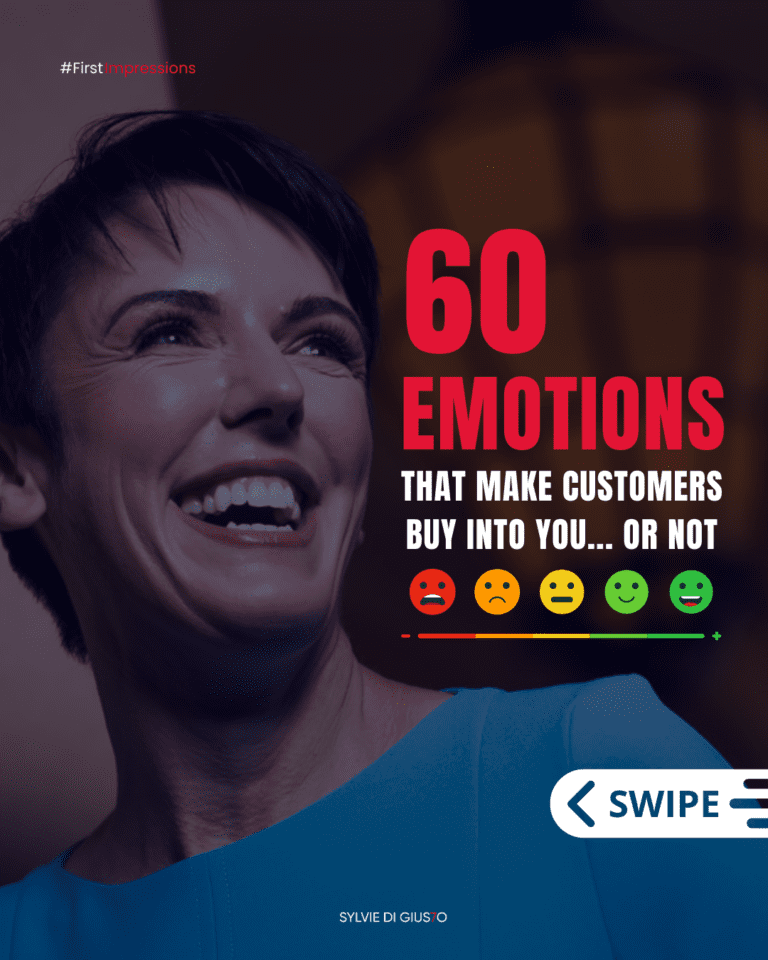
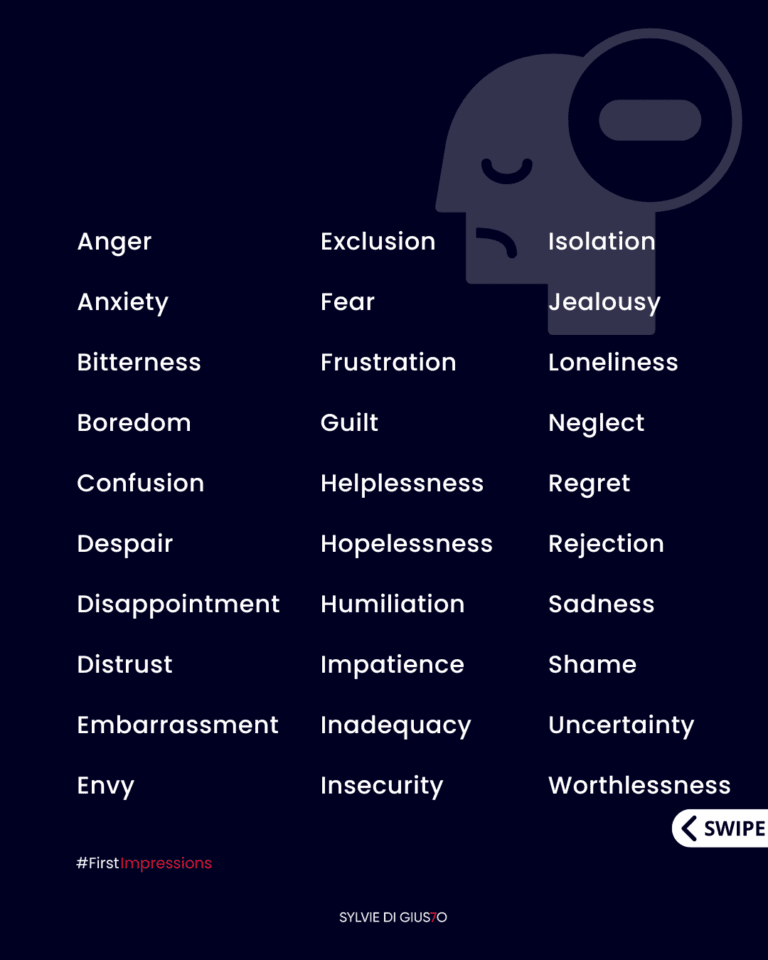
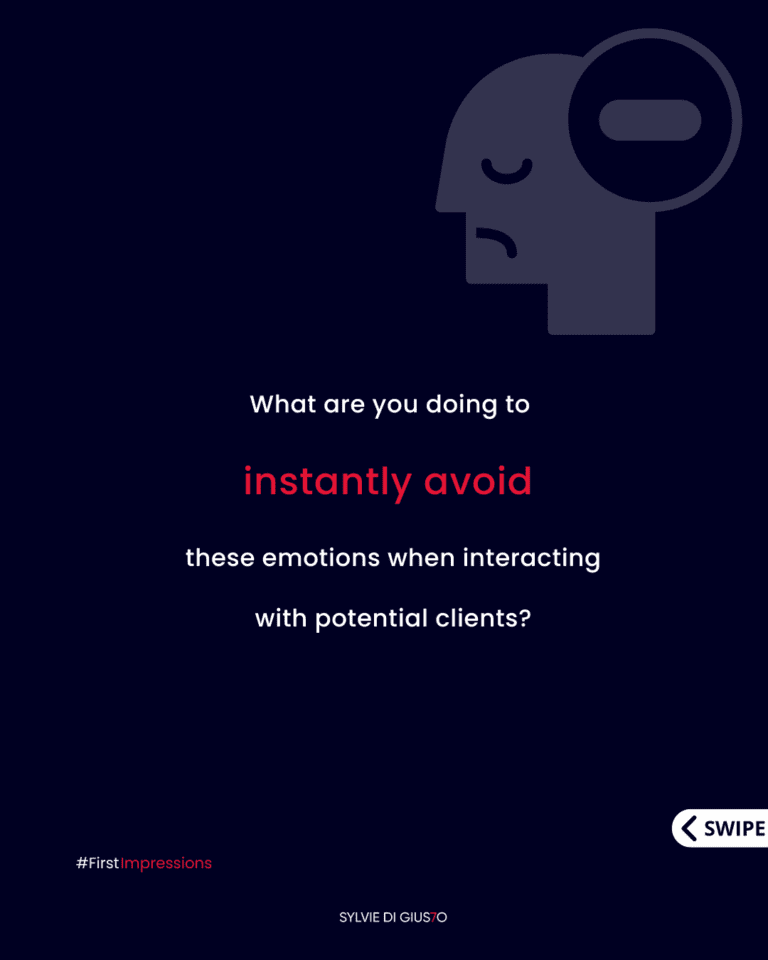
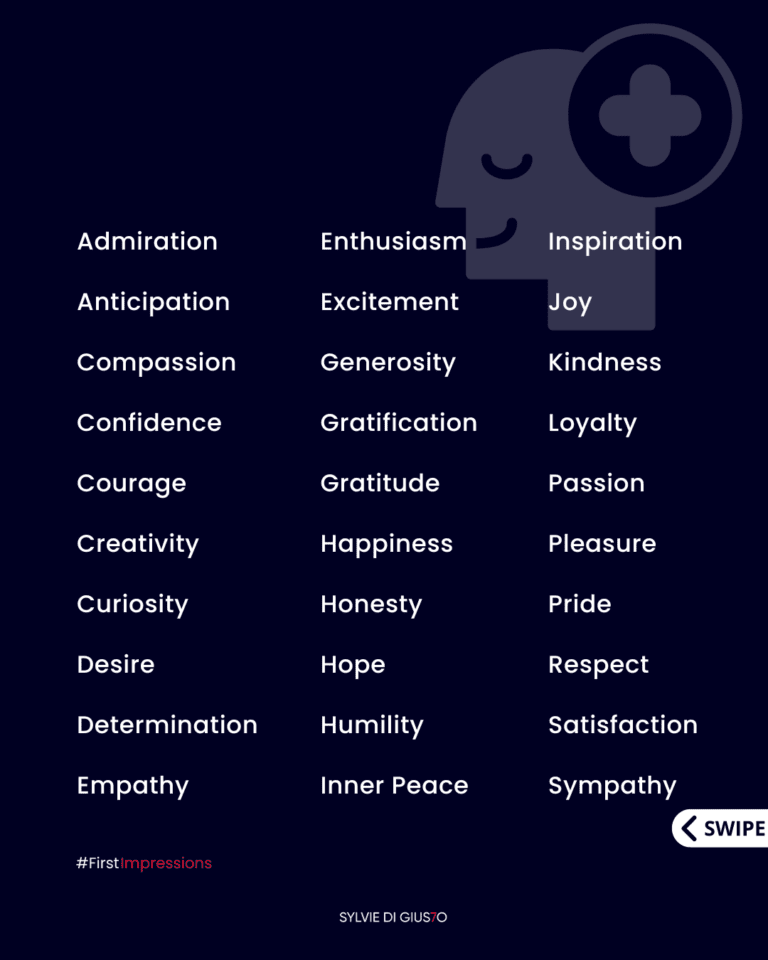
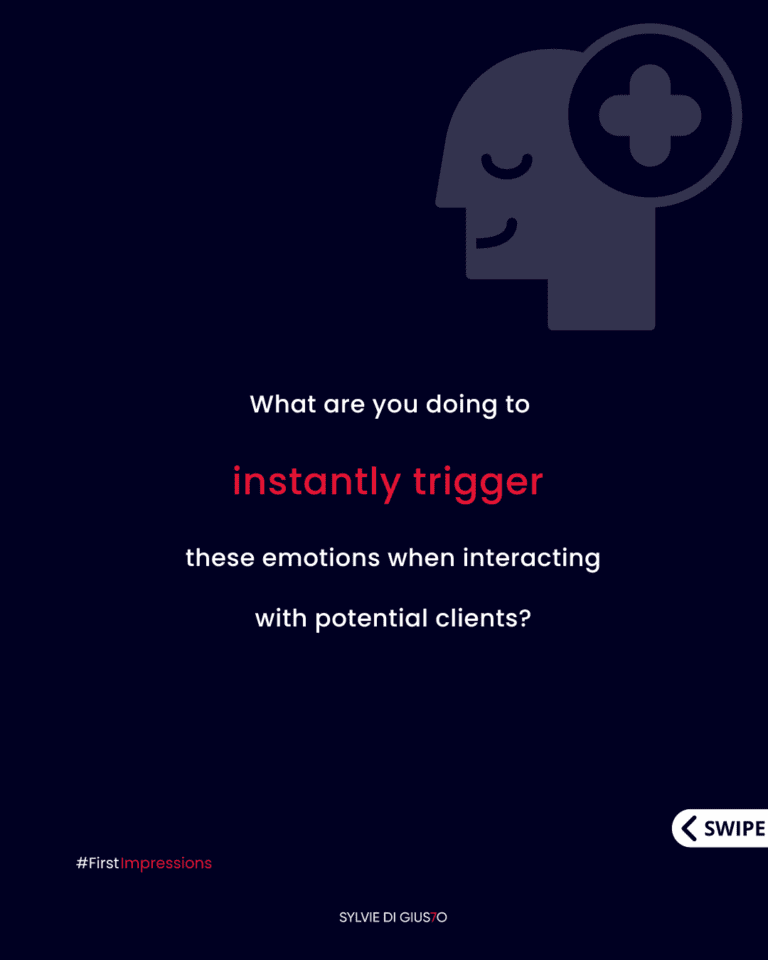

PS: Interested in more content like this? Make sure to follow me on Instagram. It’s where I visualize and publish my thoughts daily. I hope to see you there.
